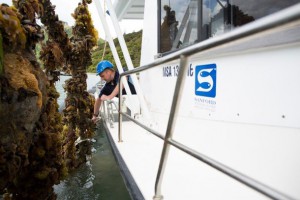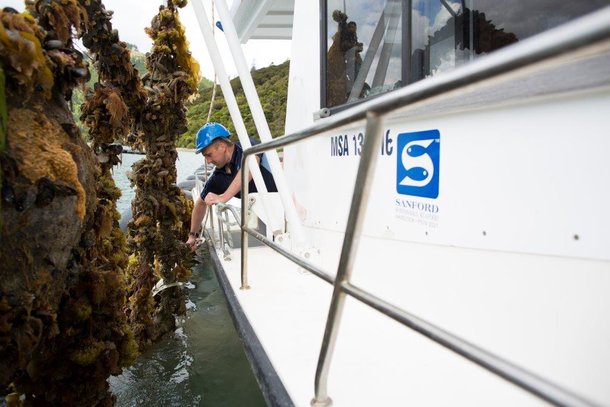 Seafood processor Sanford is considering closing its mussel plant in Christchurch, which employs 232 people. Sanford staff shucking mussels at the Riccarton plant say they have been on unpredictable shifts of two to five days a week for a while.
Seafood processor Sanford is considering closing its mussel plant in Christchurch, which employs 232 people. Sanford staff shucking mussels at the Riccarton plant say they have been on unpredictable shifts of two to five days a week for a while.
Chief Executive Volker Kuntzsch says higher ocean temperatures had affected the growth of its farmed mussels in the Marlborough Sounds and its supply of wild, young mussel spats that it harvests from other places for future stock. The long-term outlook for consistently high spat-growth in the wild was “a little grim”, said Kuntzsch.
All fishing companies operating along the northern South Island coastline were finding fewer mussels and it seemed to be linked to different weather, he said. Recent El Nino and La Nina weather cycles had warmed the ocean and made the loss of mussels “much more pronounced than usual”. The listed company could no longer be sure whether it would be “open every single week for the next six months” and was no longer prepared to ride out this much uncertainty, explains Kuntzsch.
He says that given the outlook of Greenshell mussel crop supply in the short to medium term there is a need to improve the capacity utilisation across processing locations in the South Island. “Sanford operates a manual opening plant in Christchurch and an automated facility in Havelock, in close proximity to the mussel farms in the Marlborough Sounds. Combining the volumes in one plant would eliminate the strong likelihood of intermittent processing interruptions, unpredictable shift patterns and two sub optimal manufacturing environments. This would also facilitate some level of protection against current pricing in international mussel markets, limiting the impact on the contribution mussels make to Sanford’s performance.”
The night shift at the Havelock mussel factory has been temporarily cut as Sanford struggles with the diminished mussel crops. Kuntzsch said the volume of mussels being processed at the Havelock factory was not enough to support both a day shift and a night shift. The night shift might return if Sanford goes ahead with a proposed closure of its Christchurch factory, Kuntzsch said.
The company’s market share in mussels is about 40%. Its production had fallen because of the upper South Island problems, but Kuntzsch expects it to soon be producing more, using less-affected bases in Coromandel and Bluff.
The current shortfall was likely to lift the export value of New Zealand mussels, but wouldn’t impact on the retail price in NZ, he said.
The seafood industry is beginning to see the effect of warmer seas, from Kingfish being found around Stewart Island, to reports of an unusual number of salmon found dead at a NZ salmon farm. If the warmer water was part of a more regular pattern it may last seven to 15 years, Kuntzsch said.



